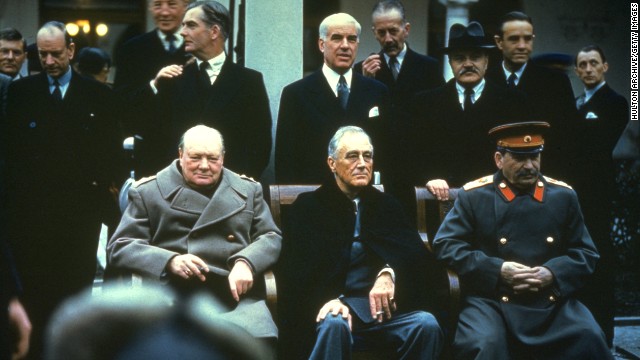 The end of World War II set the stage for the Cold War, the struggle between communism and capitalism that pitted East against West and pushed the world to the brink of nuclear war. The Crimean resort town of Yalta was the setting for an historic meeting of British, U.S. and Soviet leaders -- Winston Churchill, Franklin D. Roosevelt and Josef Stalin -- in February 1945. With the defeat of Nazi Germany imminent, the Big Three allies agreed to jointly govern postwar Germany, while Stalin pledged fair and open elections in Poland.
The end of World War II set the stage for the Cold War, the struggle between communism and capitalism that pitted East against West and pushed the world to the brink of nuclear war. The Crimean resort town of Yalta was the setting for an historic meeting of British, U.S. and Soviet leaders -- Winston Churchill, Franklin D. Roosevelt and Josef Stalin -- in February 1945. With the defeat of Nazi Germany imminent, the Big Three allies agreed to jointly govern postwar Germany, while Stalin pledged fair and open elections in Poland. 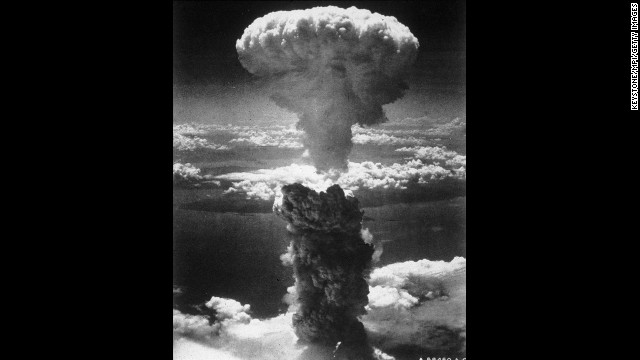 The decision by the United States to use the atomic bomb against Japan in August 1945 was credited with ending World War II. Hundreds of thousands in Hiroshima and Nagasaki were killed instantly or died from radiation in the aftermath of the bombings.
The decision by the United States to use the atomic bomb against Japan in August 1945 was credited with ending World War II. Hundreds of thousands in Hiroshima and Nagasaki were killed instantly or died from radiation in the aftermath of the bombings. 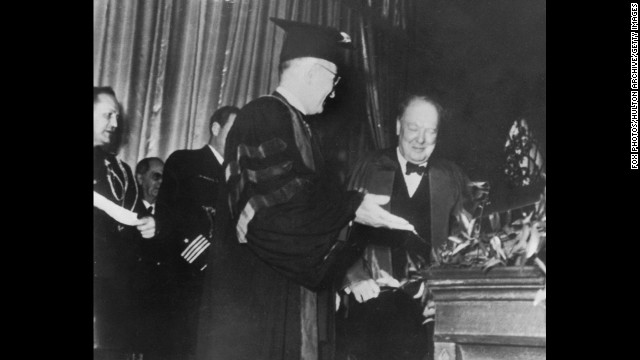 President Harry S. Truman introduces Winston Churchill at Westminster College in Fulton, Missouri, on March 5, 1946. In his speech, the former British prime minister declared, "From Stettin in the Baltic to Trieste in the Adriatic, an Iron Curtain has descended across the Continent."
President Harry S. Truman introduces Winston Churchill at Westminster College in Fulton, Missouri, on March 5, 1946. In his speech, the former British prime minister declared, "From Stettin in the Baltic to Trieste in the Adriatic, an Iron Curtain has descended across the Continent."  In 1947, U.S. Secretary of State George Marshall proposed a massive aid program to rebuild Europe after the ravages of World War II. Nearly $13 billion in U.S. aid was sent to Europe from 1948 to 1952 under the Marshall Plan, but the Soviet Union and communist Eastern Europe declined U.S. aid, citing "dollar enslavement." Here, an American worker paints the Marshall Plan logo on a machine tool ready to be exported to Europe.
In 1947, U.S. Secretary of State George Marshall proposed a massive aid program to rebuild Europe after the ravages of World War II. Nearly $13 billion in U.S. aid was sent to Europe from 1948 to 1952 under the Marshall Plan, but the Soviet Union and communist Eastern Europe declined U.S. aid, citing "dollar enslavement." Here, an American worker paints the Marshall Plan logo on a machine tool ready to be exported to Europe. 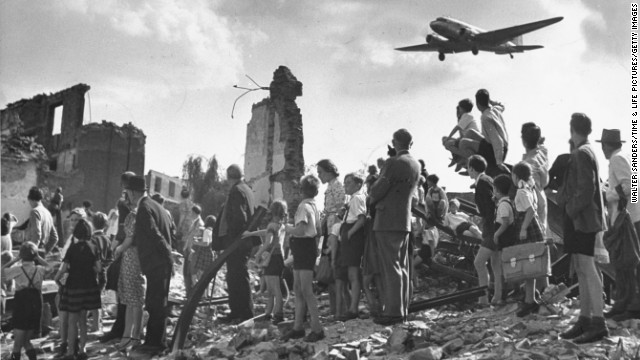 On June 24, 1948, the Soviet Union made a bid for control of Berlin by blockading all land access to the city. Berlin was divided into four sectors under U.S., British, French and Soviet control, but the city itself lay entirely in Soviet-occupied eastern Germany. From June 1948 to May 1949, U.S. and British planes airlifted 1.5 million tons of supplies to the residents of West Berlin. After 200,000 flights, the Soviet Union lifted the blockade. Here, a tattered group of Berliners stand amid the ruins of a building near Tempelhof Airfield as a C-47 cargo plane brings food to the city.
On June 24, 1948, the Soviet Union made a bid for control of Berlin by blockading all land access to the city. Berlin was divided into four sectors under U.S., British, French and Soviet control, but the city itself lay entirely in Soviet-occupied eastern Germany. From June 1948 to May 1949, U.S. and British planes airlifted 1.5 million tons of supplies to the residents of West Berlin. After 200,000 flights, the Soviet Union lifted the blockade. Here, a tattered group of Berliners stand amid the ruins of a building near Tempelhof Airfield as a C-47 cargo plane brings food to the city. 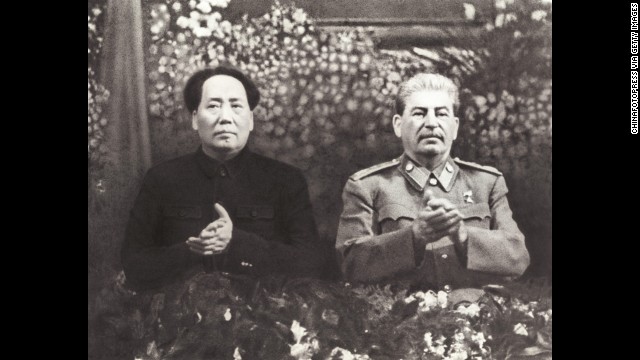 In June 1949, Chinese Communists declared victory over Chiang Kai-shek's Nationalist forces, who later fled to Taiwan. On October 1, Mao Zedong proclaimed the People's Republic of China. Two months later, Mao (left) traveled to Moscow to meet with Josef Stalin (right) and negotiate the Sino-Soviet Treaty of Friendship, Alliance and Mutual Assistance.
In June 1949, Chinese Communists declared victory over Chiang Kai-shek's Nationalist forces, who later fled to Taiwan. On October 1, Mao Zedong proclaimed the People's Republic of China. Two months later, Mao (left) traveled to Moscow to meet with Josef Stalin (right) and negotiate the Sino-Soviet Treaty of Friendship, Alliance and Mutual Assistance. 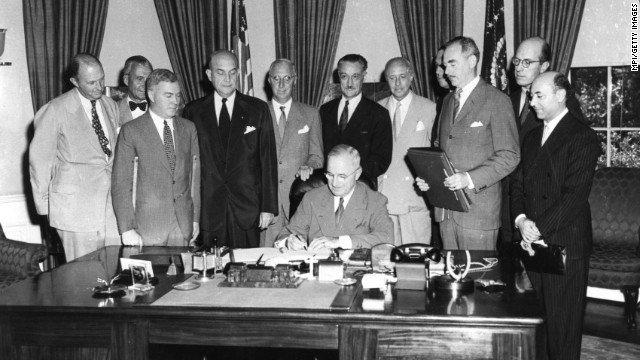 In August 1949, President Truman signed the North Atlantic Treaty, which marked the beginning of NATO. Two years earlier, he requested $400 million in aid from Congress to combat communism in Greece and Turkey. The Truman Doctrine pledged to provide American economic and military assistance to any nation threatened by communism.
In August 1949, President Truman signed the North Atlantic Treaty, which marked the beginning of NATO. Two years earlier, he requested $400 million in aid from Congress to combat communism in Greece and Turkey. The Truman Doctrine pledged to provide American economic and military assistance to any nation threatened by communism. 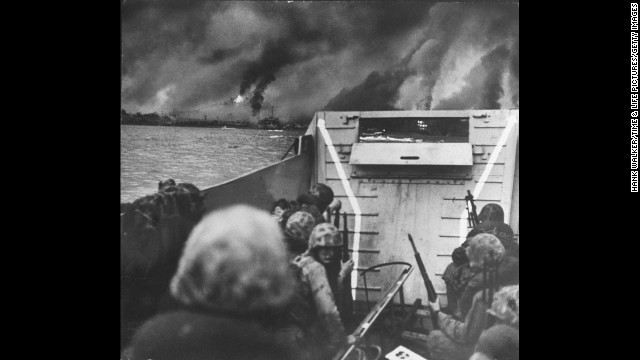 On June 25, 1950, North Korean Communist forces invaded South Korea. Two days later, President Truman ordered U.S. forces to assist the South Koreans. Here, U.S. Marines land at Inchon as the battle rages. Three years later, an armistice agreement was signed, with the border between North and South roughly the same as it had been in 1950. The willingness of China and North Korea to end the fighting was in part attributed to the death of Stalin in March. There has never been a peace treaty, so the Korean War, technically, has never ended.
On June 25, 1950, North Korean Communist forces invaded South Korea. Two days later, President Truman ordered U.S. forces to assist the South Koreans. Here, U.S. Marines land at Inchon as the battle rages. Three years later, an armistice agreement was signed, with the border between North and South roughly the same as it had been in 1950. The willingness of China and North Korea to end the fighting was in part attributed to the death of Stalin in March. There has never been a peace treaty, so the Korean War, technically, has never ended. 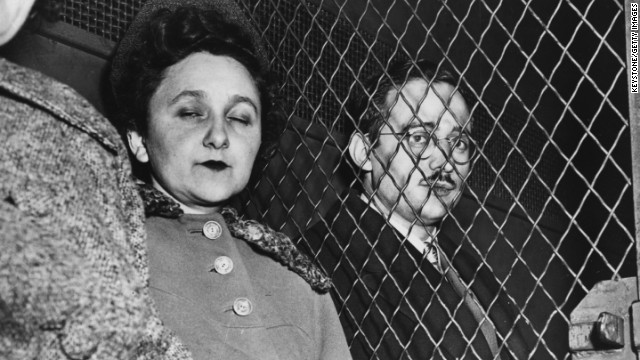 On March 29, 1951, Julius and Ethel Rosenberg were convicted of selling U.S. atomic secrets to the Soviet Union. The Rosenbergs were sent to the electric chair in 1953, despite outrage from liberals who portrayed them as victims of an anti-communist witch hunt.
On March 29, 1951, Julius and Ethel Rosenberg were convicted of selling U.S. atomic secrets to the Soviet Union. The Rosenbergs were sent to the electric chair in 1953, despite outrage from liberals who portrayed them as victims of an anti-communist witch hunt. 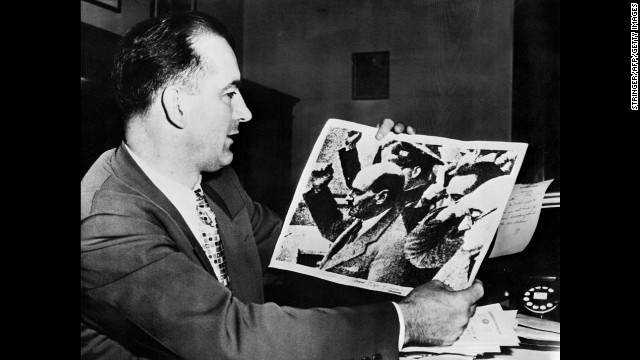 The Rosenbergs' conviction helped fuel the rise of McCarthyism, the anti-communist campaign led by U.S. Sen. Joseph McCarthy of Wisconsin in 1953-54 at the peak of the Cold War. Nearly 400 Americans -- including the ordinary, the famous and some who wore the uniform of the U.S. military -- were interrogated in secret hearings, facing accusations from McCarthy and his staff about their alleged involvement in communist activities. While McCarthy enjoyed public attention and initially advanced his career with the start of the hearings, the tide turned. His harsh treatment of Army officers in the secret hearings precipitated his downfall.
The Rosenbergs' conviction helped fuel the rise of McCarthyism, the anti-communist campaign led by U.S. Sen. Joseph McCarthy of Wisconsin in 1953-54 at the peak of the Cold War. Nearly 400 Americans -- including the ordinary, the famous and some who wore the uniform of the U.S. military -- were interrogated in secret hearings, facing accusations from McCarthy and his staff about their alleged involvement in communist activities. While McCarthy enjoyed public attention and initially advanced his career with the start of the hearings, the tide turned. His harsh treatment of Army officers in the secret hearings precipitated his downfall. 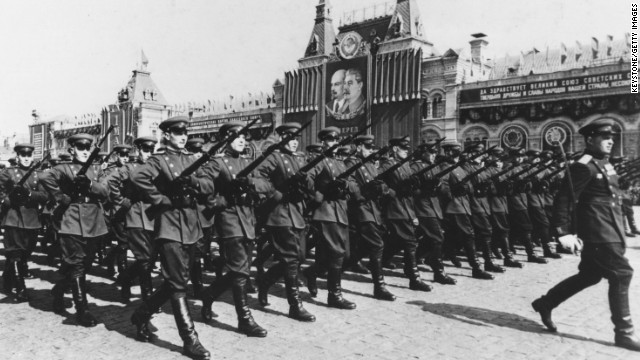 In 1955, the Warsaw Pact was organized, creating a military alliance of communist nations in Eastern Europe that included Bulgaria, Czechoslovakia, East Germany, Hungary, Poland, Romania and the Soviet Union. Here, the Soviet Army marches during May Day celebrations in 1954.
In 1955, the Warsaw Pact was organized, creating a military alliance of communist nations in Eastern Europe that included Bulgaria, Czechoslovakia, East Germany, Hungary, Poland, Romania and the Soviet Union. Here, the Soviet Army marches during May Day celebrations in 1954. 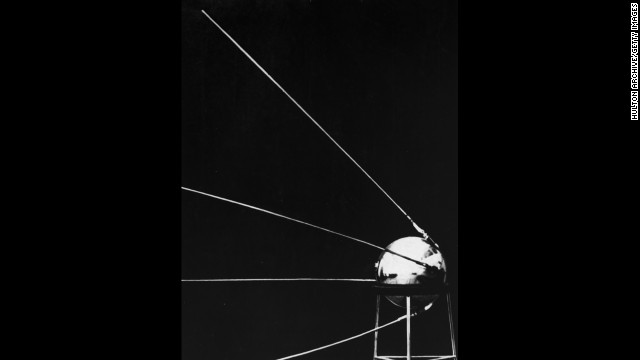 On October 4, 1957, the Soviet Union launched Sputnik, the first man-made satellite to orbit the Earth. In 1958, the United States created NASA, the National Aeronautics and Space Administration, and the space race was in full gear.
On October 4, 1957, the Soviet Union launched Sputnik, the first man-made satellite to orbit the Earth. In 1958, the United States created NASA, the National Aeronautics and Space Administration, and the space race was in full gear. 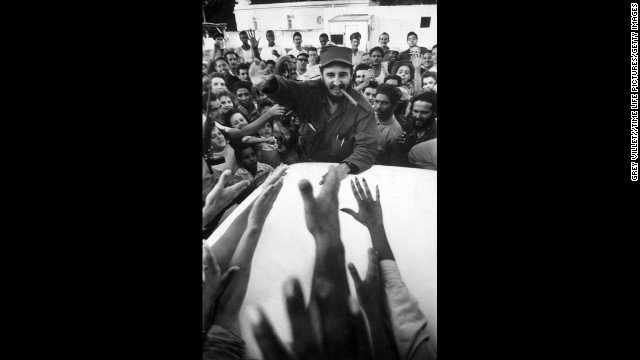 On January 1, 1959, leftist forces under Fidel Castro overthrew the government of Fulgencio Batista in Cuba. Castro soon nationalized the sugar industry and signed trade agreements with the Soviet Union. The next year, his government seized U.S. assets on the island.
On January 1, 1959, leftist forces under Fidel Castro overthrew the government of Fulgencio Batista in Cuba. Castro soon nationalized the sugar industry and signed trade agreements with the Soviet Union. The next year, his government seized U.S. assets on the island. 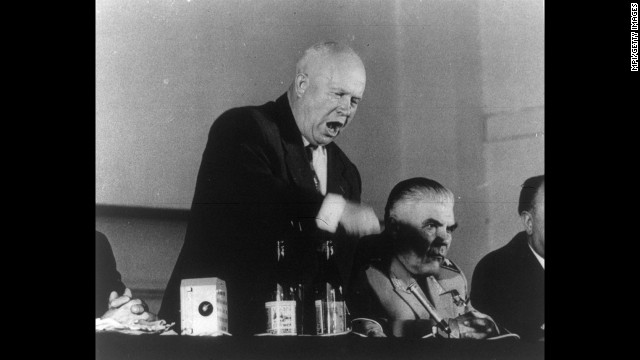 Soviet leader Nikita Khrushchev speaks at the 1960 Paris Summit, which was interrupted when an American high-altitude U-2 spy plane was shot down on a mission over the Soviet Union. After the Soviets announced the capture of pilot Francis Gary Powers, the United States recanted earlier assertions that the plane was on a weather research mission.
Soviet leader Nikita Khrushchev speaks at the 1960 Paris Summit, which was interrupted when an American high-altitude U-2 spy plane was shot down on a mission over the Soviet Union. After the Soviets announced the capture of pilot Francis Gary Powers, the United States recanted earlier assertions that the plane was on a weather research mission. 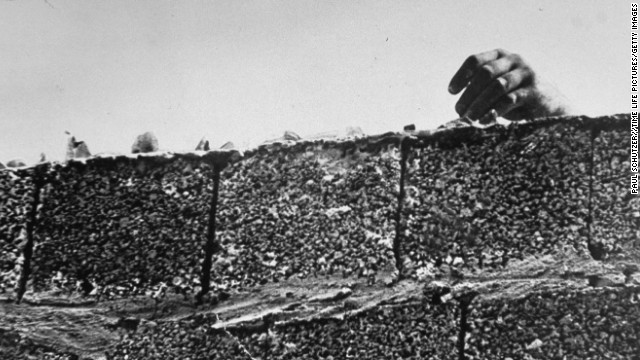 A hand reaches over the glass imbedded in the newly constructed Berlin Wall, which divided the eastern and western sectors of the city in August 1961. The U.S. had rejected proposals by Soviet leader Nikita Khrushchev to make Berlin a "free city" with access controlled by East Germany, and on August 15, Communist authorities began construction on the wall to prevent East Germans from fleeing to West Berlin.
A hand reaches over the glass imbedded in the newly constructed Berlin Wall, which divided the eastern and western sectors of the city in August 1961. The U.S. had rejected proposals by Soviet leader Nikita Khrushchev to make Berlin a "free city" with access controlled by East Germany, and on August 15, Communist authorities began construction on the wall to prevent East Germans from fleeing to West Berlin. 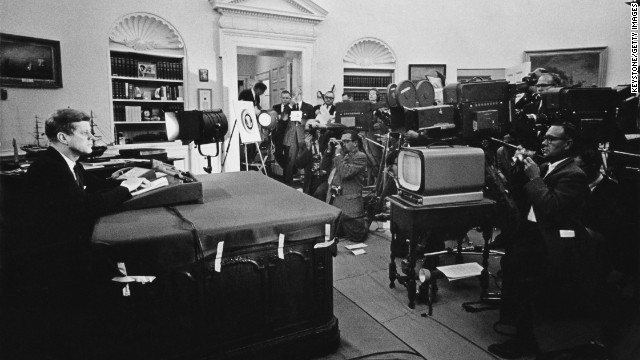 In 1961, a U.S.-organized invasion of 1,400 Cuban exiles is defeated by Castro's forces at the Bay of Pigs. U.S. President John F. Kennedy takes full responsibility for the disaster. The next year, the Soviet Union installs nuclear missiles on Cuba capable of reaching most of the U.S. Kennedy orders a naval blockade of Cuba until the Soviets removes the missiles; he announces the move on TV (pictured). Six days later, the Soviets agree to remove the missiles, defusing one of the most dangerous confrontations of the Cold War. In 1963, the U.S. and Soviet Union agreed to install a hot line allowing the leaders to communicate directly during a crisis.
In 1961, a U.S.-organized invasion of 1,400 Cuban exiles is defeated by Castro's forces at the Bay of Pigs. U.S. President John F. Kennedy takes full responsibility for the disaster. The next year, the Soviet Union installs nuclear missiles on Cuba capable of reaching most of the U.S. Kennedy orders a naval blockade of Cuba until the Soviets removes the missiles; he announces the move on TV (pictured). Six days later, the Soviets agree to remove the missiles, defusing one of the most dangerous confrontations of the Cold War. In 1963, the U.S. and Soviet Union agreed to install a hot line allowing the leaders to communicate directly during a crisis. 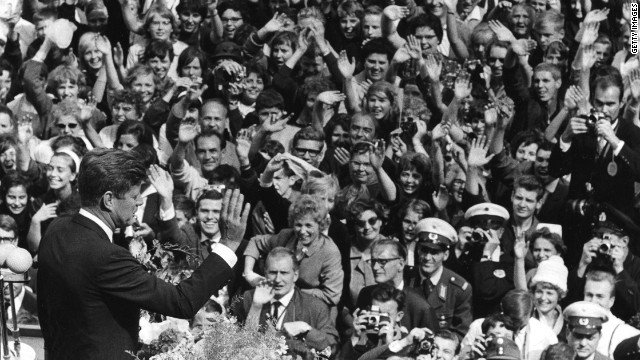 An estimated 250,000 people crammed a large Berlin square to hear President Kennedy speak in 1963. "All free men, wherever they may live, are citizens of Berlin," Kennedy told the crowd. "And therefore, as a free man, I take pride in the words, 'Ich bin ein Berliner.'" A few months later, the president would be assassinated in Dallas, an event that jarred the nation and the world.
An estimated 250,000 people crammed a large Berlin square to hear President Kennedy speak in 1963. "All free men, wherever they may live, are citizens of Berlin," Kennedy told the crowd. "And therefore, as a free man, I take pride in the words, 'Ich bin ein Berliner.'" A few months later, the president would be assassinated in Dallas, an event that jarred the nation and the world.  President Lyndon B. Johnson signs the Gulf of Tonkin Resolution in August 1964. The resolution, approved by Congress, gave Johnson power to send U.S. troops to South Vietnam after it was alleged that North Vietnamese patrol boats had fired on the USS Maddox in the Gulf of Tonkin.
President Lyndon B. Johnson signs the Gulf of Tonkin Resolution in August 1964. The resolution, approved by Congress, gave Johnson power to send U.S. troops to South Vietnam after it was alleged that North Vietnamese patrol boats had fired on the USS Maddox in the Gulf of Tonkin. 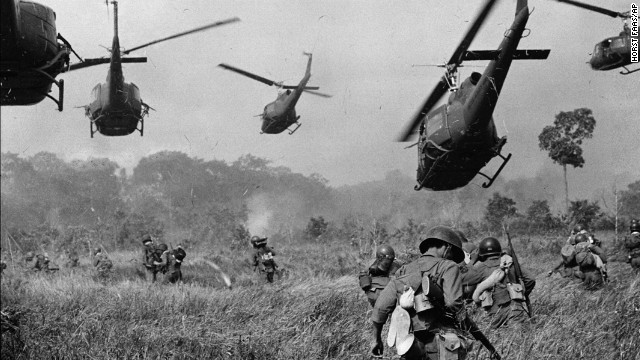 Hovering U.S. Army helicopters pour machine gun fire into the tree line to cover the advance of South Vietnamese ground troops in an attack on a Viet Cong camp northwest of Saigon, near the Cambodian border, in March 1965. The Vietnam War lasted nearly a decade and left more than 58,000 Americans dead.
Hovering U.S. Army helicopters pour machine gun fire into the tree line to cover the advance of South Vietnamese ground troops in an attack on a Viet Cong camp northwest of Saigon, near the Cambodian border, in March 1965. The Vietnam War lasted nearly a decade and left more than 58,000 Americans dead.  On June 5, 1967, Israel launched an attack that becomes known as the Six Day War, seizing the Sinai and Gaza Strip from Egypt, the West Bank and East Jerusalem from Jordan and the Golan Heights from Syria. The Soviet Union accused the United States of encouraging Israeli aggression. Here, several Israeli soldiers stand close together in front of the Western Wall in the old city of Jerusalem following its recapture.
On June 5, 1967, Israel launched an attack that becomes known as the Six Day War, seizing the Sinai and Gaza Strip from Egypt, the West Bank and East Jerusalem from Jordan and the Golan Heights from Syria. The Soviet Union accused the United States of encouraging Israeli aggression. Here, several Israeli soldiers stand close together in front of the Western Wall in the old city of Jerusalem following its recapture. 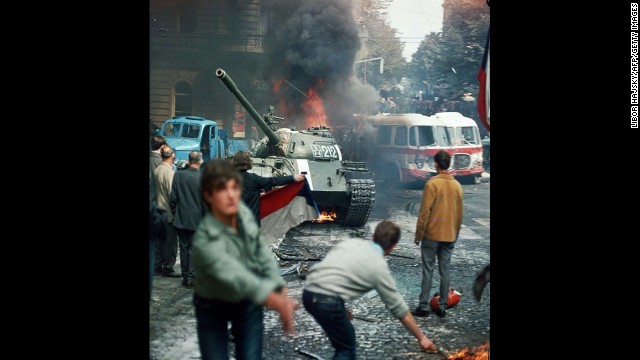 On January 5, 1968, reformer Alexander Dubcek became general secretary of the Communist Party in Czechoslovakia, pledging the "widest possible democratizations" as the Prague Spring movement swept across the country. Soviet and Warsaw Pact leaders sent an invasion force of 650,000 troops in August. Dubcek was arrested and hard-liners were restored to power. Here, residents carrying a Czechoslovak flag and throwing burning torches attempt to stop a Soviet tank in Prague on August 21, 1968.
On January 5, 1968, reformer Alexander Dubcek became general secretary of the Communist Party in Czechoslovakia, pledging the "widest possible democratizations" as the Prague Spring movement swept across the country. Soviet and Warsaw Pact leaders sent an invasion force of 650,000 troops in August. Dubcek was arrested and hard-liners were restored to power. Here, residents carrying a Czechoslovak flag and throwing burning torches attempt to stop a Soviet tank in Prague on August 21, 1968.  Apollo 11 astronaut Edwin E. "Buzz" Aldrin Jr. salutes the U.S. flag on the lunar surface on July 20, 1969. He and mission commander Neil Armstrong became the first humans to walk on the moon. Their mission was considered an American victory in the Cold War and subsequent space race, meeting President Kennedy's goal, voiced in 1961, of "landing a man on the moon and returning him safely to the earth" before the end of the decade.
Apollo 11 astronaut Edwin E. "Buzz" Aldrin Jr. salutes the U.S. flag on the lunar surface on July 20, 1969. He and mission commander Neil Armstrong became the first humans to walk on the moon. Their mission was considered an American victory in the Cold War and subsequent space race, meeting President Kennedy's goal, voiced in 1961, of "landing a man on the moon and returning him safely to the earth" before the end of the decade. 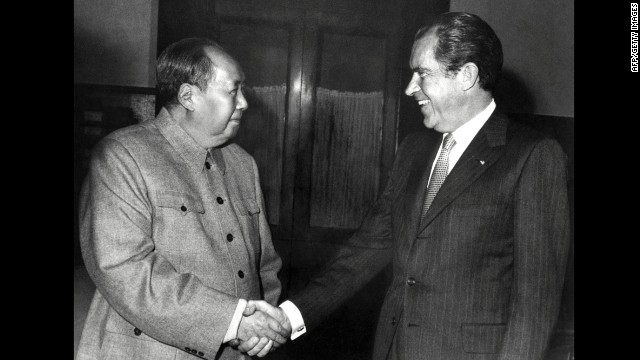 Chinese leader Mao Zedong shakes hands with U.S. President Richard Nixon after their meeting in Beijing on February 22, 1972. Nixon became the first U.S. president to visit China. The two countries issued a communiqué recognizing their "essential differences" while making it clear that "normalization of relations" was in all nations' best interests. The rapprochement changed the balance of power with the Soviets. Two-and-a-half years later, Nixon resigned as president amid the Watergate scandal.
Chinese leader Mao Zedong shakes hands with U.S. President Richard Nixon after their meeting in Beijing on February 22, 1972. Nixon became the first U.S. president to visit China. The two countries issued a communiqué recognizing their "essential differences" while making it clear that "normalization of relations" was in all nations' best interests. The rapprochement changed the balance of power with the Soviets. Two-and-a-half years later, Nixon resigned as president amid the Watergate scandal. 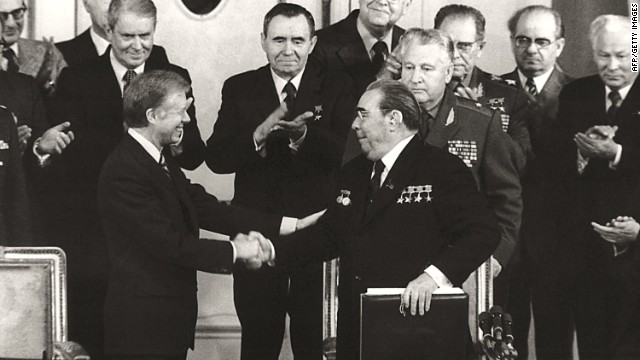 U.S. President Jimmy Carter and Soviet leader Leonid Brezhnev shake hands after signing the SALT II treaty limiting strategic arms in Vienna, Austria, on June 18, 1979. The first phase of Strategic Arms Limitation Talks began in Helsinki, Finland, with a finished agreement signed by President Nixon and Brezhnev in Moscow on May 26, 1972. It placed limits on both submarine-launched and intercontinental nuclear missiles.
U.S. President Jimmy Carter and Soviet leader Leonid Brezhnev shake hands after signing the SALT II treaty limiting strategic arms in Vienna, Austria, on June 18, 1979. The first phase of Strategic Arms Limitation Talks began in Helsinki, Finland, with a finished agreement signed by President Nixon and Brezhnev in Moscow on May 26, 1972. It placed limits on both submarine-launched and intercontinental nuclear missiles. 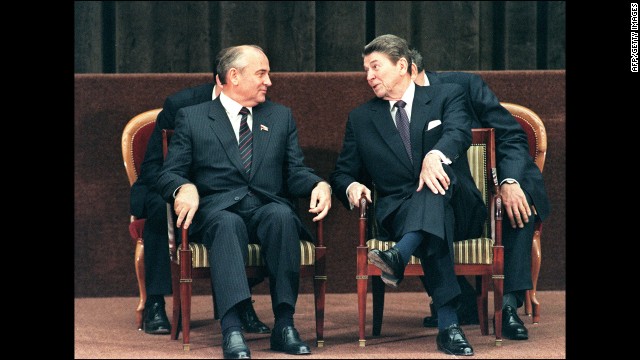 President Ronald Reagan talks to Soviet leader Mikhail Gorbachev during a two-day summit between the superpowers in Geneva, Switzerland on November 21, 1985. Gorbachev ushered in an era of economic reforms under perestroika and greater political freedoms under glasnost. Two years later, Reagan and Gorbachev signed the Intermediate Range Nuclear Forces Treaty in Washington. It mandated the removal of more than 2,600 medium-range nuclear missiles from Europe, eliminating the entire class of Soviet SS-20 and U.S. Cruise and Pershing II missiles.
President Ronald Reagan talks to Soviet leader Mikhail Gorbachev during a two-day summit between the superpowers in Geneva, Switzerland on November 21, 1985. Gorbachev ushered in an era of economic reforms under perestroika and greater political freedoms under glasnost. Two years later, Reagan and Gorbachev signed the Intermediate Range Nuclear Forces Treaty in Washington. It mandated the removal of more than 2,600 medium-range nuclear missiles from Europe, eliminating the entire class of Soviet SS-20 and U.S. Cruise and Pershing II missiles. 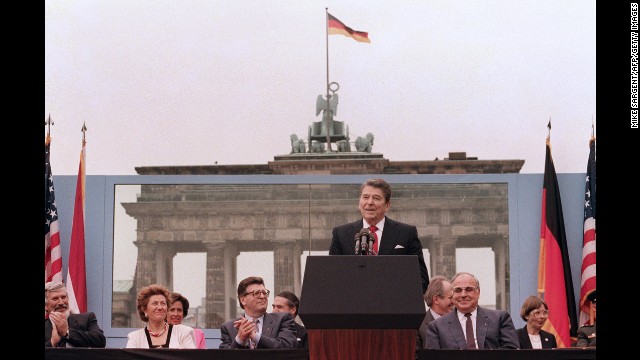 President Reagan, commemorating the 750th anniversary of Berlin, addresses the people of West Berlin at the base of the Brandenburg Gate, near the Berlin Wall on June 12, 1987. Due to the amplification system being used, the President's words could also be heard on the Eastern (communist-controlled) side of the wall. "Tear down this wall!" was the famous appeal by Reagan, directed at Gorbachev, to destroy the Berlin Wall. The address Reagan delivered that day is considered by many to have affirmed the beginning of the end of the Cold War and the fall of the Soviet bloc.
President Reagan, commemorating the 750th anniversary of Berlin, addresses the people of West Berlin at the base of the Brandenburg Gate, near the Berlin Wall on June 12, 1987. Due to the amplification system being used, the President's words could also be heard on the Eastern (communist-controlled) side of the wall. "Tear down this wall!" was the famous appeal by Reagan, directed at Gorbachev, to destroy the Berlin Wall. The address Reagan delivered that day is considered by many to have affirmed the beginning of the end of the Cold War and the fall of the Soviet bloc. 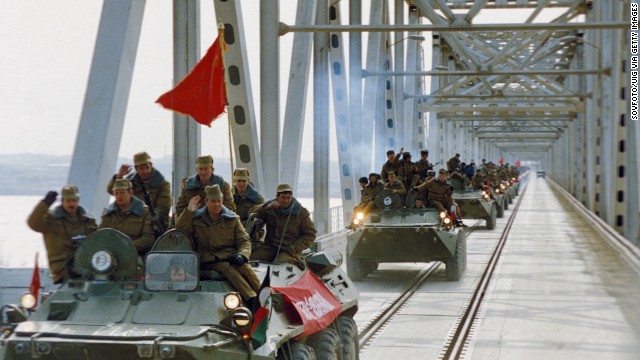 Soviet troops cross the Soviet-Afghan border along the bridge over the Amu Darya river near the town of Termez, Uzbekistan, during their withdrawal from Afghanistan on February 6, 1989. The Soviet Union invaded Afghanistan in 1979 as communist Babrak Karmal seized control of the government. U.S.-backed Muslim guerrilla fighters waged a costly war against the Soviets for nearly a decade.
Soviet troops cross the Soviet-Afghan border along the bridge over the Amu Darya river near the town of Termez, Uzbekistan, during their withdrawal from Afghanistan on February 6, 1989. The Soviet Union invaded Afghanistan in 1979 as communist Babrak Karmal seized control of the government. U.S.-backed Muslim guerrilla fighters waged a costly war against the Soviets for nearly a decade. 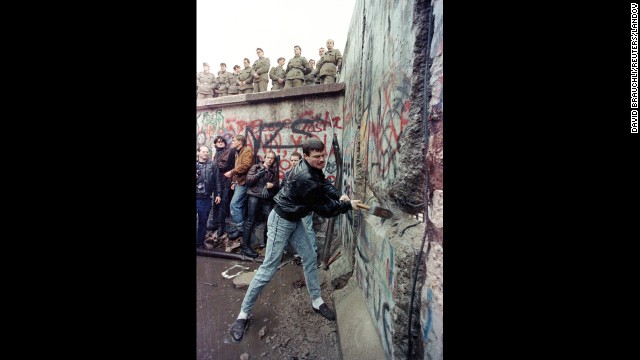 A demonstrator pounds away at the Berlin Wall as East Berlin border guards look on from above the Brandenburg Gate on November 11, 1989. Gorbachev renounced the Brezhnev Doctrine, which pledged to use Soviet force to protect its interests in Eastern Europe. On September 10, Hungary opened its border with Austria, allowing East Germans to flee to the West. After massive public demonstrations in East Germany and Eastern Europe, the Berlin Wall fell on November 9.
A demonstrator pounds away at the Berlin Wall as East Berlin border guards look on from above the Brandenburg Gate on November 11, 1989. Gorbachev renounced the Brezhnev Doctrine, which pledged to use Soviet force to protect its interests in Eastern Europe. On September 10, Hungary opened its border with Austria, allowing East Germans to flee to the West. After massive public demonstrations in East Germany and Eastern Europe, the Berlin Wall fell on November 9.  While vacationing in the Crimean peninsula, Gorbachev was ousted in a coup by Communist hard-liners on August 19, 1991. The coup soon faltered as citizens took to the streets of Moscow and other cities in support of Russian President Boris Yeltsin (pictured), who denounced the coup. Military units abandoned the hard-liners, and Gorbachev was released from house arrest. He officially resigned on December 25 as the Soviet Union was dissolved.
While vacationing in the Crimean peninsula, Gorbachev was ousted in a coup by Communist hard-liners on August 19, 1991. The coup soon faltered as citizens took to the streets of Moscow and other cities in support of Russian President Boris Yeltsin (pictured), who denounced the coup. Military units abandoned the hard-liners, and Gorbachev was released from house arrest. He officially resigned on December 25 as the Soviet Union was dissolved.  Jubilant people step on the head of the statue of Felix Dzerzhinsky, the founder and chief of the Soviet secret police, later known as KGB, which was toppled in front of the KGB headquarters in Moscow, on August 23, 1991. The KGB was responsible for mass arrests and executions.
Jubilant people step on the head of the statue of Felix Dzerzhinsky, the founder and chief of the Soviet secret police, later known as KGB, which was toppled in front of the KGB headquarters in Moscow, on August 23, 1991. The KGB was responsible for mass arrests and executions.
- November 9 marks 25th anniversary of fall of Berlin Wall
- James A. Baker was secretary of state the day the Berlin Wall fell
- Anniversary a moment to celebrate "magical moment," Baker says
Editor's note: James A. Baker III served as the 61st U.S. secretary of state, and was in office the day the Berlin Wall fell. The views expressed are his own.
(CNN) -- There have always been great moments in global events that changed world history. On July 4, 1776, Americans signed the Declaration of Independence and began their march toward democracy. On September 2, 1945, World War II mercifully ended when Japan surrendered after more than 50 million had died during that brutal conflict. And on November 9, 1989, the people in occupied East Germany took control of their own destinies when they literally hammered the Berlin Wall to the ground.
It is hard to recapture the breathtaking drama of that period in Europe 25 years ago. Throughout 1989, there were clear signs that the Soviet Empire was crumbling. In Poland, Hungary and elsewhere, popular movements successfully challenged Soviet-backed regimes that had long since lost their legitimacy.
But nowhere was the drama greater than in East and West Germany, the epicenter of the Cold War. Since August 13, 1961, when East Germany erected the terrible barrier that cut off West Berlin from East Berlin and East Germany, the wall became a dreaded symbol of isolation and despair. Family members were separated, and for the next quarter of a century, more than 100 Germans were killed trying to escape past the wall.
 2009: Bush on fall of Berlin Wall
2009: Bush on fall of Berlin Wall  Hasselhoff fights for Berlin Wall
Hasselhoff fights for Berlin Wall Then, on October 9, 1989, more than 70,000 East Germans gathered outside the Nikolai Church in Leipzig carrying candles of peace and chanting, "Wir sind das Volk!" We are the people! Demonstrations were followed by more and larger protests, in Leipzig and around East Germany. Precisely one month later, the Berlin Wall fell.
The United States had long supported German unification and we backed the efforts of Chancellor Helmut Kohl and other German leaders to move toward rapid political and economic integration of East Germany into the Federal Republic. Of course, there were international complications: Soviet leader Mikhail Gorbachev had signaled that the Soviet Union would not act militarily to stop unification. So it was still important to find ways for Gorbachev to fend off criticism from Kremlin hardliners. Moreover, Britain's Margaret Thatcher and France's Francois Mitterrand were initially skeptical about a unified Germany.
To deal with these concerns, we developed the "two plus four talks." Under this formula, the two German governments negotiated the internal terms of reunification while the four occupying powers -- the United States, the Soviet Union, France and Great Britain -- addressed its international aspects.
The successful talks resulted in the Treaty on the Final Settlement with Respect to Germany signed by all six parties in Moscow on September 12, 1990. That treaty ended the limitations on German sovereignty that had existed since World War II.
The leadership role President George H.W. Bush played in German unification was pivotal, but Kohl and Gorbachev also played truly decisive roles. The former brought immense passion and creativity to the process. The latter, despite bitter opposition by reactionaries at home, remained committed to a resolution without bloodshed. Above all, though, unification was achieved by the German people, in Leipzig and elsewhere, who never lost faith in freedom and never lost hope for the future.
Looking back, one of President Bush's outstanding traits has been his humility, and particularly his insistence after the Iron Curtain fell that Americans not gloat about our victory in the decades-long Cold War against the Soviet empire. In 1989, after all, the President still had further business to do with Soviet leaders, even as their country was rapidly imploding. Included on his checklist were nuclear arms reductions, which were later accomplished and have played a critical role in maintaining world peace.
Time and time again, President Bush demanded that we not dance on the ruins of the Berlin Wall. He simply wouldn't hear of it.
But 25 years later, on November 9, 2014, we should all enjoy a celebratory jig to commemorate what happened on that fateful day. That magical moment is a reminder to all people everywhere in the world -- those alive then, today and well into the future. Tyranny cannot suppress the will of those yearning for freedom and desiring a better life for themselves and for their children.
Read CNNOpinion's new Flipboard magazine
Follow us on Twitter @CNNOpinion.
Join us on http://ift.tt/1bl3g0P.
No comments:
Post a Comment